Ukraine war: The stolen faces used to promote Vladimir Putin
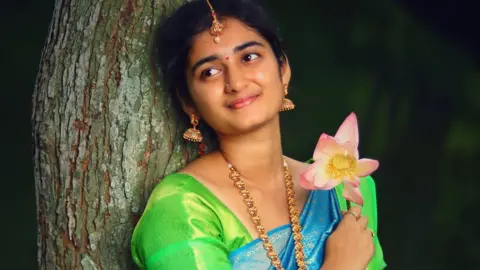 ER Yamini
ER YaminiIndian influencer ER Yamini has never tweeted in her life - she prefers to cultivate her big fan bases on Instagram and YouTube.
But in early March, a Twitter account using her picture tweeted: "#IStandWithPutin. True Friendship" accompanied by a video showing two men hugging - one representing India, the other, Russia.
Yamini says she doesn't support either country in the Russia-Ukraine war, and worries about her fans.
"If they see that tweet, what will they think about me?" she asks, "I wish they wouldn't use my photo on that profile."
The fake account is part of a network promoting Russian president Vladimir Putin on Twitter, which used the hashtags #IStandWithPutin and #IStandWithRussia on 2 and 3 March. This led to trending topics in different regions - particularly in the global south, apparently showing support for the war, in countries including India, Pakistan, South Africa and Nigeria.
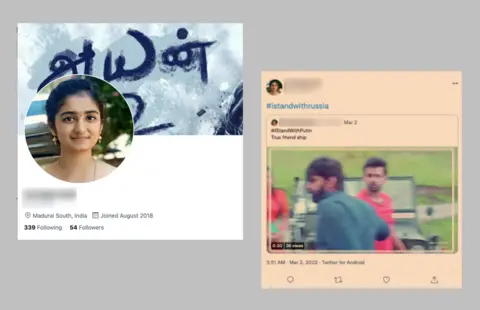 Twitter
TwitterPart of the activity tracked was organic - in other words, produced by real people - reflecting genuine support in some countries for Mr Putin and Russia.
But many other profiles appear to have been inauthentic. They retweeted messages in high quantities, produced few original messages, and were created very recently.
"They were likely produced by bots, fake profiles or compromised accounts, artificially amplifying support for Putin in these countries," says Carl Miller, co-founder of CASM Technology, a company that researches online harms and disinformation.
It tracked 9,907 profiles promoting support for Russia on 2 and 3 March, in several different languages. CASM found more than 1,000 of those accounts had spam-like characteristics.
The BBC investigated hundreds of these seemingly inauthentic profiles. Our research confirms Mr Miller's thinking - they try to pass as genuine, but in fact are fake.
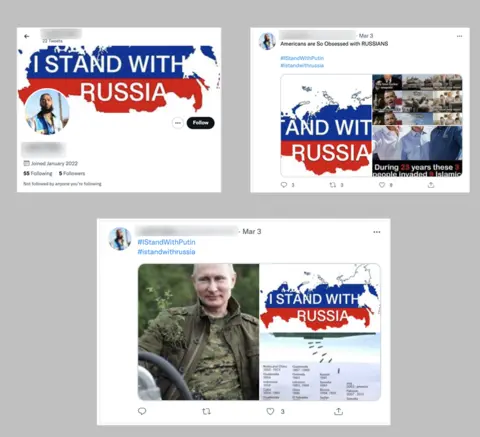 Twitter
TwitterThrough reverse image searching, we have found that pictures used by these profiles were copied from celebrities, influencers and ordinary users, who had no idea their images were being used to support Russia in its war against Ukraine.
We have not been able to determine who set up the accounts, or whether they have any connection to the Russian government.
An account named Preety Sharma, for example, states in its bio that they are a "model and entrepreneur" originally from India, now in Miami. It was created on 26 February, two days after Russia's invasion. "Putin is a good person", says one of its retweets.
But the woman depicted in the account's profile picture is in the other side of the world. Nicole Thorne is an Australian social media influencer who has 1.5 million followers on Instagram, and only occasionally uses her original profile on Twitter.
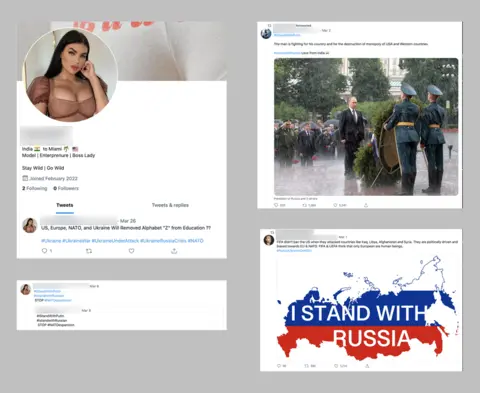 Twitter
TwitterAnother account tries to pass as Indian singer Raja Gujjar. Its first tweet was posted on 24 February, the first day of the invasion. And all 178 posts by the account are retweets, a strong indicator of automation.
The BBC contacted Ms Thorne and Mr Gujjar, and both confirmed these accounts weren't theirs.
Although very bot-like, not all accounts investigated were inauthentic.
Take one profile, created in February 2022 with tweets starting on 2 March. It has no followers. Reverse searching its profile picture, the BBC came across a young Indian man's account on LinkedIn.
But it's authentic, and set up by Senthil Kumar, an aeronautical engineer. We asked why he created an account just to retweet pro-Russia messages.
"Usually, I open Twitter and see what is trending. So I saw these posts and just retweeted them," he said. He believes Russia has supported India in the past, and Indians should now support Russia. And his profile was new, he said, because he had forgotten the password of his previous account.
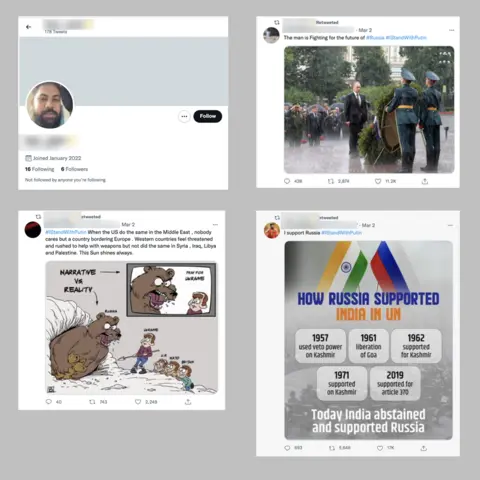 Twitter
TwitterNot the West
The accounts tweet a mixture of criticism of Western countries, express solidarity between the so-called Brics countries (Brazil, Russia, India, China, South Africa), and offer direct support to Mr Putin.
"We default to the idea that information campaigns will be directed to the West. Yet none of the accounts were addressing the West nor claimed to be from the West," says Mr Miller.
To identify what might be a group of inauthentic accounts, he adds, researchers look at accounts' creation dates, an "inhuman" tweeting pattern (such as an account tweeting 24 hours a day), and the range of topics tweeted.
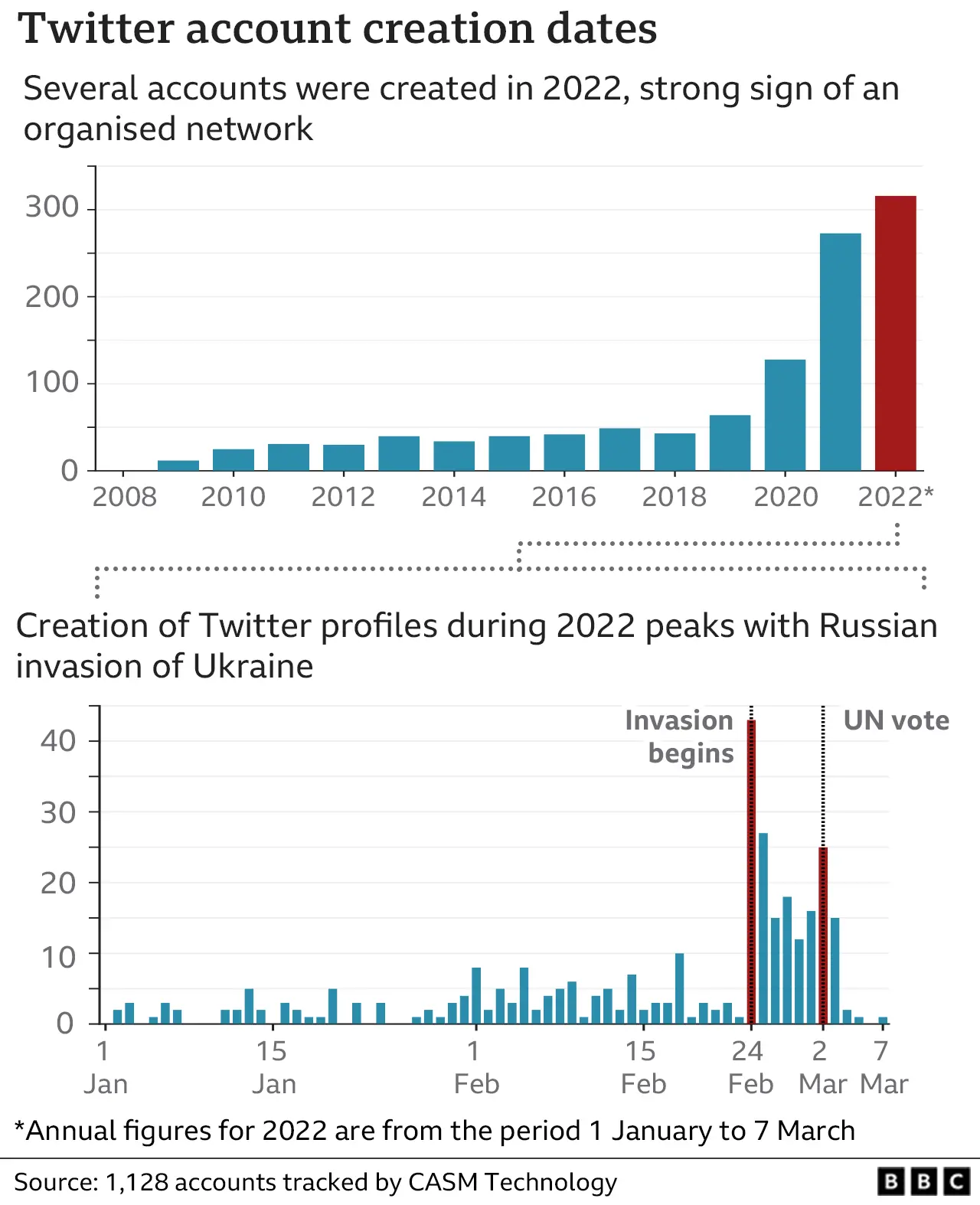
"None of these things are a smoking gun, but they all add up together to allow us to see if a given community of accounts look like it's suspicious," says Mr Miller.
The lack of a genuine profile picture can also be a telltale sign.
Out of a sample of 100 accounts tracked by CASM, the BBC found that 41 had no profile pictures. Another 30 had illustrations or pictures of personalities like Mr Putin or Facebook chief executive Mark Zuckerberg. Only a quarter had pictures depicting people - and some of those were stolen.
Twitter prohibits the impersonation of "individuals, groups, or organisations to mislead, confuse, or deceive others".
The company told us that since the war began, it has removed more than 100,000 accounts for violations of its platform manipulation and spam policy, including the suspension of dozens of accounts connected with the hashtags #IStandWithRussia and #IStandWithPutin.
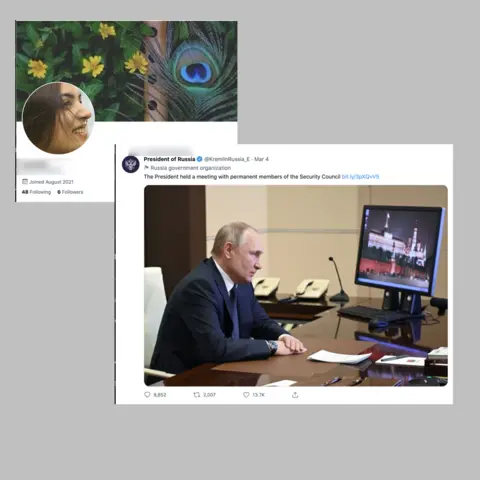 Twitter
TwitterTwitter says it has investigated and suspended hundreds of the accounts pointed out by CASM's research and sent to the platform by the BBC, including 11 out of 12 accounts specifically flagged by us for using other people's profile pictures.
But it said it found no evidence of widespread co-ordination to artificially amplify sentiment around the Ukraine war.
